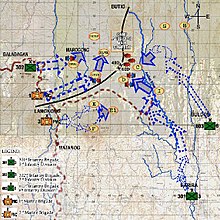Battle of Camp Abubakar
| Battle of Camp Abubakar | |||||||
|---|---|---|---|---|---|---|---|
| Part of the Moro conflict and the 2000 Philippine campaign against the Moro Islamic Liberation Front | |||||||
 Positions of three Philippine Army brigades and two Philippine Marine Corps brigades in relation to Camp Abubakar's central complex during the sixth day of the battle. |
|||||||
|
|||||||
| Belligerents | |||||||
|
|
|
||||||
| Commanders and leaders | |||||||
|
|
|
||||||
| Units involved | |||||||
|
|
|||||||
| Casualties and losses | |||||||
| 12 killed | 23 killed | ||||||
|
|
![]() Armed Forces of the Philippines
Armed Forces of the Philippines
The Battle of Camp Abubakar, (codenamed Operation Terminal Velocity) was the final phase of the 2000 Philippine campaign against the Moro Islamic Liberation Front which resulted in the capture of Camp Abubakar al Siddique, stronghold of the Moro Islamic Liberation Front and its largest settlement, and seat of its Shariah-based government.
Prior to April 2000, the MILF had been allowed to operate approximately 50 camps that were off limits to government soldiers. When the MILF broke off peace talks, the Armed Forces of the Philippines, the Philippine Army in particular, began attacking and destroying the bases one after the other.
Camp Abubakar covered approximately forty square miles and included a mosque, a madrasah, commercial and residential areas, a weapons factory, a solar energy system, and segments of seven different villages.
The Moro Islamic Liberation Front, a faction of the Moro National Liberation Front which had broken away in 1977, initially supported the MNLF during the peace talks that culminated in the 1996 Final Peace Agreement. They however, rejected the agreement as inadequate, reiterating a demand for a "Bangsamoro Islamic State", and not just simple political autonomy. That same year, the MILF began informal talks with the government of Fidel V. Ramos. These talks, however, were not pursued and the MILF began recruiting and establishing camps, becoming the dominant Muslim rebel group.
...
Wikipedia
